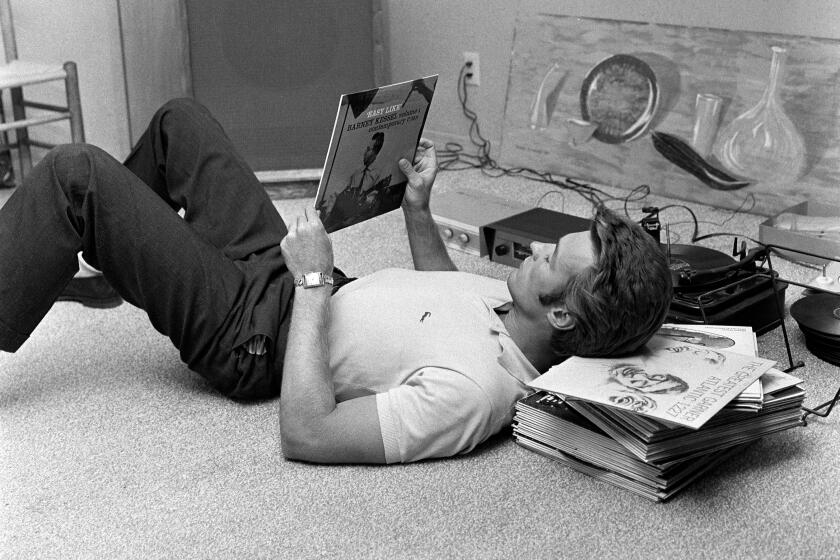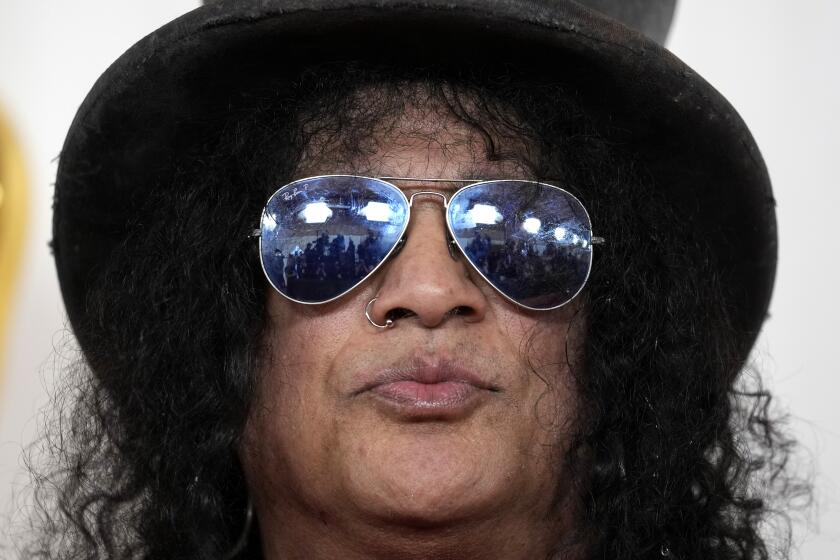Self-quarantine challenge: The Doors are rock gods. Iâve always hated them. Can I learn to love them?

Jim Morrison never worried about overstating his case, so allow me to follow his lead in saying that what weâre living through right now is a moment weirder than any since the Doors recorded âStrange Daysâ more than half a century ago. âWe linger alone, bodies confused,â Morrison sings with eerie prescience in the swirling psych-rock title track from the second of the bandâs two 1967 LPs; elsewhere in the song he describes waiting for a force to âdestroy our casual joys,â which pretty well nails my worry about the broadband conking out days into a self-isolation that could last months.
âStrange Daysâ isnât the only Doors tune newly relevant to the extraordinary age of COVID-19. In âRiders on the Storm,â Morrison warns that your âsweet family will dieâ if you let a killer invade your personal space, while âShip of Foolsâ opens with a vision of the human race being snuffed out. (I suppose âThe Endâ speaks for itself.) If I didnât know better, Iâd think these apocalyptic vibes were reason to get deep into the Doors over the next few weeks â to look to the music Morrison and his bandmates made as a means of understanding this bleak and unprecedented period in modern history.
Except I do know better: I hate the Doors.
How to keep Coronavirus stress at bay: Listen, really listen, to your favorite albums, front to back, without distraction.
Of all the canonical classic-rock acts, this Los Angeles quartet has always struck me as the worst â corny, dumb, long-winded and crucially without the sense of humor that might have gone some way toward redeeming its shortcomings (as indeed humor did on occasion for every other self-important classic-rock act). Yes, Morrisonâs bellow had undeniable sex appeal. But those overheated lyrics! And sure, the band had grooves and hooks. But that rinky-dink organ tone! Somehow the music felt sophomoric and pretentious at the same time â a 14-year-oldâs conception of danger and sophistication.

Iâve hardly been alone in my disdain for the Doors, whose endurance on rockâs A-list has raised countless criticsâ eyebrows in the decades since Morrisonâs death at age 27 in 1971. Even writer Eve Babitz, who carried on a romantic relationship with the dreamy-eyed frontman, called the group âembarrassingâ in a 1991 Esquire story pegged to that yearâs Oliver Stone biopic. (Especially cringey, in Babitzâs view, was that the band named itself after an Aldous Huxley book: âWhat an Ojai-geeky-too-L.A.-pottery-glazer kind of uncool idea,â she wrote.)
Yet with hours at home to fill between now and who knows when, perhaps the time has come to try to crack open the assumptions and long-held biases that closed my Gen X ears to these OK Boomer icons. After all, what kind of Angeleno am I if I canât hear the value in a group that did at least as much as the Beach Boys to establish the myth of Southern California?
Morrisonâs interest, of course, lay in the dark extremes of that West Coast fantasy â in the chaos and hedonism beyond Brian Wilsonâs promise of fun-in-the-sun satisfaction. And thatâs much harder to portray convincingly without tipping over into caricature; Iâd say the Byrds and Love got closer than the Doors to managing it, albeit with lead singers unblessed by the looks that made millions more pay attention to the leather-pantsed Lizard King.
The costs are not just economic: lamenting the emotional and intellectual downsides of a month (or more) without live music during the coronavirus pandemic.
Thing is, I donât generally have a problem with caricature; it certainly hasnât prevented me from loving Lana Del Rey, who can be just as over the top as Morrison was in her handling of some of the same themes. Does it help that Del Rey is a woman interrogating toxic masculinity as opposed to a guy helping to codify it? For sure. But Iâve also been happily drawn in by Morrissey and Glenn Danzig, to name two transplanted Californians clearly working after Morrisonâs chest-beating example.
Thereâs something specific, then, about the Doorsâ frontman â a countercultural figure forever stuck in the â60s thanks to his premature demise â that Iâll need to get past if I am to come around to the band. Or if not get past then understand in a new way. Maybe Iâm wrong about Morrisonâs humorlessness, which â my tastes having been shaped by deadpan wits from Kurt Cobain to the Notorious B.I.G. â more or less represents a deal-breaker for me. I canât say I hear anything in âLight My Fireâ or âL.A. Womanâ to suggest that Morrison was in on the joke of bad poetry like âMotel, money, murder, madness / Letâs change the mood from glad to sadness.â But thereâs definitely a glimmer of comedy in the way he oompahs his way to the next whiskey bar in âAlabama Song.â

The Doorsâ spooky-funky version of that Brecht-Weill classic is also one of the few selections in its catalog that uses the bandâs unusual instrumentation â Ray Manzarek on keyboards, Robby Krieger on guitar, John Densmore on drums â to its advantage. Most of the time the Doors sound woefully brittle to me, with nowhere near enough bottom end to support Morrisonâs outsize vocals; thatâs another result, no doubt, of years spent listening to hip-hop and dance music, neither of which has made it any easier to buy into the bandâs narrative of transcendent scuzz.
And yet rappers and producers have actually found compelling source material in the Doorsâ music, which has hundreds of millions of Spotify streams to go along with the innumerable booze bottles fans have left at Morrisonâs grave. In 2001 Jay-Z famously sampled âFive to Oneâ for his throbbing âTakeoverâ; Skrillex even drafted the groupâs surviving members for a 2011 track full of squelchy dubstep bass. As I sit with the bandâs core half-dozen studio albums â even I, an avowed Morrison skeptic, am galled that they made a couple of more after the singer died â Iâll try to hear what those younger admirers heard.
The latest updates from our reporters in California and around the world
As for supplemental material, thereâs plenty to keep busy with, including Stoneâs polarizing movie, memoirs by Densmore and Manzarek (the latter of whom died in 2013) and critical appraisals by folks who didnât require a shelter-in-place order to wrestle with this group. In his recent-ish âThe Doors: A Lifetime of Listening to Five Mean Years,â Greil Marcus writes of Morrison, âHereâs this nice-looking person on the stage all but threatening you with a spiritual death penalty and turning you into a jury that convicts yourself.â
As usual with Marcus â and with the Doors â Iâm not entirely sure what that means. But the end of the world seems like the right time to figure it out.
More to Read
The biggest entertainment stories
Get our big stories about Hollywood, film, television, music, arts, culture and more right in your inbox as soon as they publish.
You may occasionally receive promotional content from the Los Angeles Times.













